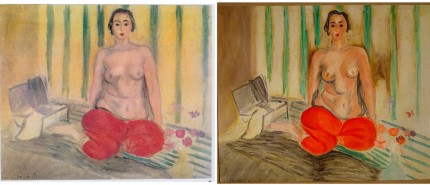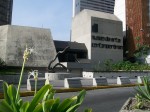Odalisque in Red Pants is back in Venezuela after more than a decade on the lam. The 1925 Matisse painting of a semi-nude woman wearing a pair of red pants was stolen from the Caracas Museum of Contemporary Art as early as 2000. Nobody knows for certain exactly when it was stolen because the thieves replaced it with a fake which was not noticed until 2002. As if that weren’t embarrassing enough, it was a really, really bad fake, too, and not just in the small details that experts would recognize. The vase in the front right of the canvas was the wrong color. Not the wrong shade. The wrong color. The original is yellow while the fake is blue.

Matisse made a series of Odalisques in the 1920s. He decorated a corner of his Nice apartment in Moorish style with a low couch, fretwork screens, carpets and colorful wall hangings. He returned again and again to theme of the harem concubine standing, sitting, reclining in sensual poses, clad in languorously draped fabrics or nothing at all. Matisse explained his motivation thus: “I paint odalisques in order to paint the nude. Otherwise, how is the nude to be painted without being artificial? But also, I know they exist. I was in Morocco. I saw them.” There are Matisse Odalisques in museums all over the world, including New York’s Museum of Modern Art, the Musée National d’Art Moderne in Paris, the National Gallery of Canada in Ottawa and Copenhagen’s Statens Museum for Kunst. Venezuela’s Odalisque in Red Pants was the only one in a Latin American museum.
 It was purchased from a New York art gallery in 1981 by Sofia Imber, art critic, collector and founder of the Museum of Contemporary Art, for $480,000. Its estimated worth today is $3 million. The museum started in Imber’s garage in 1973 became a world-class museum with a collection of about 3,000 works by contemporary masters like Picasso, Braque, Chagall, Kandinsky and Botero.
It was purchased from a New York art gallery in 1981 by Sofia Imber, art critic, collector and founder of the Museum of Contemporary Art, for $480,000. Its estimated worth today is $3 million. The museum started in Imber’s garage in 1973 became a world-class museum with a collection of about 3,000 works by contemporary masters like Picasso, Braque, Chagall, Kandinsky and Botero.
The theft of the painting came to light in late 2002 when Miami-based Venezuelan gallery owner Genaro Ambrosino alerted museum officials that he had been approached by someone attempting to sell him the Odalisque in Red Pants. After no further leads on the theft for nine years, in 2011 the F.B.I. found out that a Cuban man was attempting to sell the painting in Miami. Agents made a deal with the seller, Pedro Antonio Marcuello Guzman, to buy the painting for $740,000 and in July of 2012, agents met with Guzman and a woman named María Martha Ornelas, wife of Guzman’s “Mexican partner,” who carried the Matisse rolled up in a poster tube from Mexico City to a Miami hotel. They told the agents during their sales pitch that the painting was stolen by museum employees and replaced with the crappy fake. After examining the work, the F.B.I. agents arrested the would-be sellers.
Repatriation discussions have been ongoing ever since. Finally on Monday the painting arrived at the Maiquetia International Airport in Caracas where it was greeted by Culture Minister Fidel Barbarito and a live television broadcast.
“It’s generally well preserved,” Culture Minister Fidel Barbarito told local television from Caracas airport where a white box containing the painting was shown upon arrival after a court in south Florida authorized its return.
“This is another achievement of the Bolivarian revolution, of a government in touch with the arts,” the minister said, referring to the country’s 15-year-old socialist government that began in 1999 with the election of the late Hugo Chavez.
Barbarito said the painting would undergo a delicate 72-hour “acclimatization process” and be back on display at the museum in around two weeks. There was damage to the edges of the work but not the painting itself, he said.
 That statement about the Bolivarian revolution was a not at all subtle reference to the controversy that has plagued the Venezuelan government’s approach to the arts since January of 2001 when then-President Hugo Chávez announced on his weekly radio broadcast that he had fired Sofia Imber as director of her own museum because “culture ha[d] become elitist as a result of being managed by elites,” and that he was firing her and other “elites” in the first salvo of a “Bolivarian cultural revolution.” The purge was roundly criticized by the art world.
That statement about the Bolivarian revolution was a not at all subtle reference to the controversy that has plagued the Venezuelan government’s approach to the arts since January of 2001 when then-President Hugo Chávez announced on his weekly radio broadcast that he had fired Sofia Imber as director of her own museum because “culture ha[d] become elitist as a result of being managed by elites,” and that he was firing her and other “elites” in the first salvo of a “Bolivarian cultural revolution.” The purge was roundly criticized by the art world.
The subsequent discovery of the stolen Matisse and unnoticed fake didn’t exactly cast this “revolution” in a positive light, hence the big show at the airport on Monday.
Politics: disgusting everywhere it is.